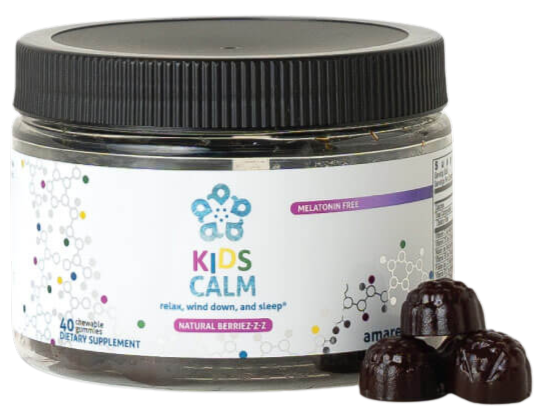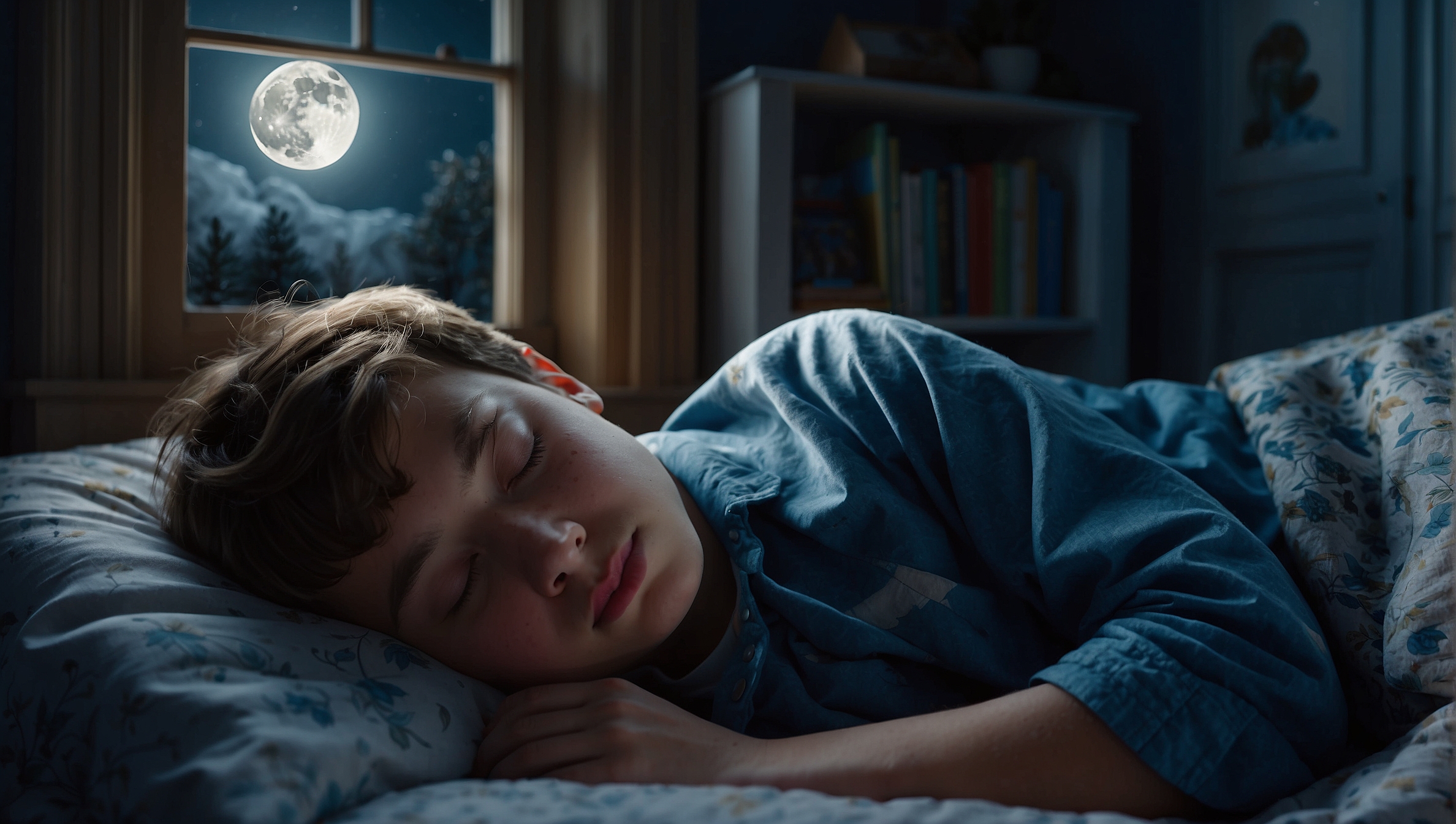In recent years, sales of melatonin supplements have skyrocketed as adults and children struggle with sleep like never before.
However, melatonin supplements aren’t necessarily safe or effective for improving quality sleep, especially when used long-term.1Gringras, P., Nir, T., Breddy, J., Frydman-Marom, A., & Findling, R. L. (2017). Efficacy and safety of pediatric prolonged-release melatonin for insomnia in children with autism spectrum disorder. Journal of the American Academy of Child & Adolescent Psychiatry, 56(11), 948-957.e4. https://doi.org/10.1016/j.jaac.2017.09.414
In fact, they do pose some risks, especially for kids. Reports of inconsistent dosage, improperly labeled ingredients, and potential overdose have added to the uncertainty surrounding melatonin use in children.
On top of that, some evidence suggests that melatonin supplementation may interfere with puberty.
In this article, we will delve into the topic of melatonin safety for kids and provide important considerations for parents.
We will discuss what melatonin is, how it affects sleep in children, the science behind melatonin and children, the pros and cons of melatonin supplements, safe melatonin usage for children, alternatives to melatonin, melatonin use in special conditions, and monitoring and managing side effects.
By understanding these key aspects, parents can make informed decisions about whether melatonin is the right choice for their child’s sleep needs.
Article Highlights
- Melatonin is a hormone that the body naturally produces to help us fall asleep and stay asleep.
- Melatonin supplements have become a popular sleep aid for children, but parents must understand the safety considerations and proper usage.
- Before turning to melatonin, try hormone-free sleep support supplements like Kids Calm, along with sensible sleep practices, including going to sleep at a consistent time, avoiding the use of digital devices at night, and keeping the bedroom dark and cool
Stop fighting sleep! Kids Calm promotes mind and body relaxation when it’s time to wind down.*

Melatonin-free Kids Calm supports the body’s natural production of melatonin, helping kids wake up feeling refreshed.
With Maizinol®, 5-HTP, and specific micronutrients, it supports GABA and serotonin levels, helping to optimize melatonin and enhancing Deep and REM sleep.*
What is Melatonin?
Melatonin is a hormone produced by the pineal gland in the brain, primarily in response to darkness.2Zhdanova, I. V., & Wurtman, R. J. (1997). Efficacy of melatonin as a sleep-promoting agent. Journal of Biological Rhythms, 12(6), 644-650. It plays a crucial role in regulating the sleep-wake cycle and circadian rhythms, which are the physical, mental, and behavioral changes that follow a 24-hour cycle, most notably the cycle of sleep and wakefulness.3Masters, A., Pandi-Perumal, S. R., Seixas, A., Girardin, L., & McFarlane, S. I. (2014). Melatonin, the Hormone of Darkness: From Sleep Promotion to Ebola Treatment. Brain Disorders & Therapy, 4(1). https://doi.org/10.4172/2168-975X.1000151
Melatonin is also involved in other physiological functions, such as blood pressure regulation, immune function, and seasonal rhythmicity in animals. In humans, melatonin levels naturally decline with age, and this decline is associated with changes in sleep patterns.
Interestingly, though, melatonin levels can be lower in children, which may lead to sleep difficulties.
Melatonin is often referred to as a sleep aid because it can help regulate sleep patterns and improve sleep quality. It is commonly used to treat sleep disorders such as insomnia and jet lag, as well as to help individuals adjust to new sleep schedules.
Melatonin is available as a dietary supplement in the form of pills, gummies, and liquid. It is classified as a dietary supplement rather than a medication because it is naturally produced by the body and can be derived from sources such as animals or plants.4Braun, M. M., Terle, D., Barstow, C., & Rodriguez, D. (2019). Pediatric Melatonin Ingestion in the United States From 2012 to 2016. Clinical Pediatrics, 58(7), 857-862. https://doi.org/10.1177/0009922819841833
However, it is important to note that melatonin is actually a hormone like cortisol, testosterone, or thyroid. It’s one of the few hormones not regulated by the U.S. Food and Drug Administration (FDA) in the same way that medications are.
In the body, melatonin acts as a neurotransmitter. Neurotransmitters are chemicals that help transmit signals between nerve cells in the brain. Melatonin is derived from the neurotransmitter serotonin, which plays a role in mood regulation and sleep. When melatonin levels rise in the evening, it signals to the body that it is time to sleep, helping to promote drowsiness and initiate the sleep process.
In essence, melatonin helps regulate your circadian rhythm, the 24-hour sleep-wake cycle that signals your body when to increase or decrease the secretion of various hormones, including cortisol, testosterone, and thyroid hormone.
For children, establishing a consistent bedtime routine that includes a regular sleep and wake-up time can help regulate their circadian rhythm and promote healthy sleep habits.
How Does Melatonin Affect Sleep in Kids?
Melatonin can be helpful for children who struggle with sleep problems.5Meltzer, L. J. (2011). Clinical management of behavioral insomnia of childhood: Treatment of bedtime problems and night wakings in young children. Behavioral Sleep Medicine, 9(4), 236-254. https://doi.org/10.1080/15402002.2011.606766 Here are a few ways in which melatonin can affect sleep in kids:
- Regulating the sleep-wake cycle: Melatonin helps to synchronize the body’s internal clock, making it easier for children to fall asleep and wake up at consistent times.
- Promoting drowsiness: Melatonin supplements can help children feel more relaxed and sleepy, making it easier for them to fall asleep at bedtime.
- Enhancing sleep quality: Melatonin can improve the timing and duration of sleep, contributing to better overall sleep quality.
- Supporting sleep hygiene: Melatonin supplements can be used as part of a comprehensive approach to sleep hygiene, which includes establishing consistent bedtime routines, creating a sleep-friendly environment, and practicing relaxation techniques.
While melatonin can be beneficial for children with sleep problems, it is important to note that it is not a cure-all solution. It should be used in conjunction with other strategies to promote healthy sleep habits and address any underlying issues that may be contributing to sleep disturbances.
Other natural options exist which can be as effective and without the risks associated with melatonin supplementation.
The Science Behind Melatonin and Children
The amount of melatonin that children naturally produce varies depending on their age and individual factors. Research suggests that children produce less melatonin than adults, which may contribute to sleep difficulties in some children.6van Geijlswijk, I. M., Korzilius, H. P., & Smits, M. G. (2010). The use of exogenous melatonin in delayed sleep phase disorder: a meta-analysis. Sleep, 33(12), 1605–1614. https://doi.org/10.1093/sleep/33.12.1605
Children with neurodevelopmental disorders, such as ADHD and autism spectrum disorders, are more likely to experience sleep disorders. Melatonin has been studied as a potential treatment for sleep problems in children with these disorders. While the research is limited, it suggests that melatonin may help improve sleep in these populations.
It is important to note that melatonin should be used under the guidance of a healthcare professional, especially for children with underlying medical conditions or who are taking other medications. A healthcare professional can determine the appropriate dosage and monitor the child’s response to melatonin.
Is Melatonin Naturally Produced in Children?
Yes, melatonin is naturally produced in children.7Kennaway, D. J., Goble, F. C., & Stamp, G. E. (1996). Factors influencing the development of melatonin rhythmicity in humans. Journal of Clinical Endocrinology & Metabolism, 81(4), 1525-1532. https://doi.org/10.1210/jcem.81.4.8636357 Its production is regulated by control centers in the brain that respond to light and darkness.
When it gets dark, these control centers, known as the suprachiasmatic nucleus, signal the pineal gland to release melatonin, which helps regulate the sleep-wake cycle.
However, some children may experience issues with melatonin production, leading to sleep difficulties.
Factors such as exposure to excessive light in the evening or disruptions in the sleep schedule can interfere with the natural production of melatonin. Late-night sports practice can also interfere with production, leading to difficulty sleeping.
In such cases, melatonin supplements can be used to help regulate the sleep-wake cycle and promote better sleep.
It is important to note that melatonin is generally considered safe for children when used as directed.
However, it is always recommended to consult with a healthcare professional, such as a pediatrician, before starting melatonin supplements for a child. They can provide guidance on the appropriate dosage and usage based on the child’s individual needs and medical history.
The Impact of Melatonin on Child Development
In recent years, there has been an increase in the use of melatonin supplements for children. While melatonin can be beneficial for improving sleep quality in the short term, it is important to consider its potential impact on child development.
Research on the long-term effects of melatonin use in children is limited. Some studies suggest that using melatonin supplements in children may not have a negative impact on their overall development.
However, more research is needed to fully understand the potential long-term effects.8Cajochen, C., Kräuchi, K., & Wirz-Justice, A. (2003). Role of melatonin in the regulation of human circadian rhythms and sleep. Journal of Neuroendocrinology, 15(4), 432-437. https://doi.org/10.1046/j.1365-2826.2003.00989.x
It is also worth noting that melatonin is not a substitute for healthy sleep hygiene practices. Establishing consistent bedtime routines, creating a sleep-friendly environment, and promoting good sleep habits are essential for supporting healthy child development and optimizing sleep quality.
Pros and Cons of Melatonin Supplements for Kids
Melatonin supplements can be a helpful tool for parents who are seeking to improve their child’s sleep quality.9Meltzer, L. J. (2011). Clinical management of behavioral insomnia of childhood: Treatment of bedtime problems and night wakings in young children. Behavioral Sleep Medicine, 9(4), 236-254. https://doi.org/10.1080/15402002.2011.606766 However, it is important to weigh the pros and cons before considering melatonin supplements for kids.
Pros:
- May improve sleep quality and duration
- Can be beneficial for children with sleep disorders or neurodevelopmental disorders
- Can be used on occasion as part of a comprehensive approach to sleep hygiene
Cons:
- Potential side effects, such as drowsiness, headaches, and agitation
- Limited research on the long-term effects of melatonin use in children
- Not regulated by the FDA like other hormones
Parents should consider these factors and consult with a healthcare professional before deciding to give their child melatonin supplements.
Benefits of Melatonin in Managing Sleep Disorders
Melatonin can be an effective sleep aid for managing sleep disorders in children. Here are some potential benefits of using melatonin in the management of sleep disorders:
- Improved sleep onset: Melatonin can help children fall asleep more quickly, reducing the time it takes for them to fall asleep after going to bed.
- Better overall sleep quality: Melatonin may contribute to better overall sleep quality by regulating the sleep-wake cycle and promoting drowsiness at night (however, it often leaves people feeling drowsy the next morning, too).
- Reduced sleep disruptions: Children with sleep disorders may experience frequent nighttime awakenings. Melatonin can help reduce these disruptions and promote more continuous sleep.
It is important to note that melatonin should be used under the guidance of a sleep specialist or healthcare professional experienced in pediatric sleep medicine. They can help determine the appropriate dosage and usage based on the child’s specific sleep disorder and individual needs.
Potential Risks and Side Effects for Children
While melatonin is generally considered safe for children when used as directed, there are potential risks and side effects that parents should be aware of.10Gupta, M., Hutchison, K., & Woolcott, C. G. (2020). Efficacy and safety of melatonin for sleep onset insomnia in children and adolescents: a meta-analysis of randomized controlled trials. Sleep Medicine, 68, 1-8. https://doi.org/10.1016/j.sleep.2019.06.001 Some possible risks and side effects of melatonin use in children include:
- Drowsiness: Melatonin can cause drowsiness during the day, which can affect a child’s alertness and performance in daily activities.
- Headaches and dizziness: Some children may experience headaches or dizziness as a side effect of melatonin.
- Mood disturbances: Melatonin can affect mood, and some children may experience mood changes or mood disturbances while taking melatonin.
- Nausea and other gastrointestinal issues: Melatonin can cause gastrointestinal symptoms such as nausea, stomach pain, or diarrhea.
If a child experiences any side effects or adverse reactions to melatonin, it is important to seek medical advice from a healthcare professional. They can provide guidance on the appropriate course of action and determine if melatonin is the right choice for the child’s sleep needs.
How Melatonin May Interfere with Puberty
Melatonin is known to have a regulatory effect on gonadotropin-releasing hormone (GnRH) secretion, which is crucial for the onset and progression of puberty. GnRH stimulates the pituitary gland to release luteinizing hormone (LH) and follicle-stimulating hormone (FSH), which in turn are critical for the development of secondary sexual characteristics and the maturation of reproductive organs. Studies suggest that melatonin may suppress GnRH secretion, potentially delaying the onset of puberty.11Waldhauser, F., Weiszenbacher, G., Tatzer, E., Gisinger, B., Waldhauser, M., Schemper, M., & Frisch, H. (1988). Alterations in nocturnal serum melatonin levels in humans with growth and aging. The Journal of Clinical Endocrinology & Metabolism, 66(3), 648-652. https://doi.org/10.1210/jcem-66-3-648
Much of the evidence linking melatonin supplementation to delayed puberty comes from animal studies. In several species, increased melatonin levels have been associated with delayed sexual maturation. For instance, in sheep and rodents, elevated melatonin levels due to extended exposure to light or direct supplementation have been shown to delay puberty onset.12Tamarkin, L., Baird, C. J., & Almeida, O. F. (1985). Melatonin: A coordinating signal for mammalian reproduction? Science, 227(4690), 714-720. https://doi.org/10.1126/science.3871252
Human studies on the effect of melatonin on puberty are less conclusive, primarily due to ethical considerations and the complexity of human puberty, which is influenced by a wide array of genetic, environmental, and physiological factors. However, there have been reports of altered puberty timing in children with certain medical conditions treated with melatonin, though these findings are not universally observed and often lack control groups for more definitive conclusions.13De Leersnyder, H. (2006). Inverted rhythm of melatonin secretion in Smith-Magenis syndrome: From symptoms to treatment. Sleep Medicine Reviews, 10(6), 419-429. https://doi.org/10.1016/j.smrv.2006.03.002
The theoretical concerns about melatonin supplementation and puberty interference stem from its role in the endocrine system. Since melatonin can influence the secretion of GnRH and, subsequently, LH and FSH, there is a hypothetical risk that long-term supplementation could affect the normal hormonal triggers necessary for puberty.
Safe Melatonin Usage for Children
Using melatonin safely for children involves considering the appropriate dosage and establishing good sleep hygiene practices.14Owens, J. A., & Moturi, S. (2009). Pharmacologic treatment of pediatric insomnia. Child and adolescent psychiatric clinics of North America, 18(4), 1001–1016. https://doi.org/10.1016/j.chc.2009.04.009 Here are some key considerations for safe melatonin usage:
- Dosage: The appropriate melatonin dosage for children should be determined in consultation with a pediatrician.15Jan, J. E., Hamilton, D., Seward, N., Fast, D. K., Freeman, R. D., & Laudon, M. (1999). Clinical trials of controlled-release melatonin in children with sleep-wake cycle disorders. Journal of Pineal Research, 27(4), 243-249. https://doi.org/10.1111/j.1600-079x.1999.tb00613.x Dosage can vary depending on the child’s age, weight, and sleep needs.
- Sleep hygiene: Melatonin supplements should be used in conjunction with good sleep hygiene practices. This includes establishing consistent bedtime routines, creating a sleep-friendly environment, and promoting healthy sleep habits.
By working with a pediatrician and prioritizing good sleep hygiene, parents can ensure the safe and effective use of melatonin for their child’s sleep needs.
Recommended Dosage Guidelines for Kids
The appropriate dosage of melatonin for children can vary depending on their age and individual needs. Here are some general guidelines for melatonin dosage in children:
- Low dose: It is recommended to start with a low dose of melatonin and gradually increase if necessary. This can help determine the minimum effective dose for the child.
- Consult a healthcare professional: It is important to consult with a pediatrician or healthcare professional before starting melatonin supplements for a child. They can provide guidance on the appropriate dosage based on the child’s age, weight, and sleep needs.
- FDA guidelines: The FDA has not established specific dosage guidelines for melatonin in children. However, it is generally recommended to start with a low dose, typically between 0.5 to 1 milligram, and adjust as needed under the guidance of a healthcare professional.
It is important to follow the recommended dosage guidelines and seek medical advice when determining the appropriate dosage of melatonin for a child.
Best Practices for Administering Melatonin to Kids
Administering melatonin to children involves following best practices to ensure safe and effective usage. Here are some best practices for administering melatonin to kids:
- Consult a sleep medicine specialist: For children with sleep disorders or complex sleep issues, it may be beneficial to consult a sleep medicine specialist. They can provide guidance on melatonin usage and help develop an individualized treatment plan.
- Choose appropriate forms: Melatonin supplements are available in various forms, including chewable tablets and liquid. Choose a form that is appropriate for the child’s age and preference.
- Administer at bedtime: Melatonin supplements should be given to the child at bedtime, ideally 30 minutes to an hour before their desired sleep time. This allows the melatonin to take effect and help regulate the sleep-wake cycle.
By following these best practices, parents can ensure the safe and effective administration of melatonin supplements for their child’s sleep needs.
Alternatives to Melatonin for Improving Sleep in Kids
While melatonin can be a helpful sleep aid for some children, there are alternative strategies that can be used to improve sleep without the use of hormones. Here are some alternatives to melatonin for improving sleep in kids:
- Behavioral strategies: Establishing consistent bedtime routines, creating a sleep-friendly environment, and promoting good sleep hygiene practices can improve children’s sleep.
- White noise machine: Using a white noise machine or other soothing sounds can help mask disruptive noises and promote a calm sleep environment.
- Blue light reduction: Minimizing exposure to blue light from electronic devices, such as smartphones and tablets, in the evening can help regulate the sleep-wake cycle and improve sleep quality.
- Good sleep hygiene: Establishing consistent bedtime routines, creating a sleep-friendly environment, and promoting healthy sleep habits are key components of good sleep hygiene.
- Bedtime routine: A consistent bedtime routine can signal to the body that it is time to wind down and prepare for sleep. This can include activities such as reading a book, taking a warm bath, or practicing relaxation techniques.
- Sleep schedule: Having a regular sleep schedule, including consistent bedtimes and wake-up times, can help regulate the body’s internal clock and promote better sleep.
By incorporating these natural methods into a child’s sleep routine, parents can help enhance sleep quality and promote healthy sleep habits.
Melatonin Use in Special Conditions
Melatonin can be particularly beneficial for children with special conditions, such as autism spectrum disorder (ASD) and attention-deficit/hyperactivity disorder (ADHD), who often experience sleep difficulties.
Here are some considerations for melatonin use in these special conditions:
- Melatonin and children with ADHD: Children with ADHD may benefit from melatonin supplementation to improve sleep quality and regulate sleep-wake cycles.
- Considerations for kids with ASD: Children with ASD often experience sleep issues, and melatonin can help regulate their sleep patterns and improve overall sleep quality.
It is important to consult with a healthcare professional, such as a pediatrician or sleep specialist, to determine the appropriate usage and dosage of melatonin for children with special conditions.
Melatonin and Children With ADHD
Children with attention-deficit/hyperactivity disorder (ADHD) often experience sleep problems, including difficulty falling asleep and maintaining sleep throughout the night. Melatonin has been studied as a potential treatment for sleep problems in children with ADHD, with promising results.16Van der Heijden, K. B., Smits, M. G., Van Someren, E. J., Ridderinkhof, K. R., & Gunning, W. B. (2007). Effect of melatonin on sleep, behavior, and cognition in ADHD and chronic sleep-onset insomnia. Journal of the American Academy of Child and Adolescent Psychiatry, 46(2), 233–241. https://doi.org/10.1097/01.chi.0000246055.76167.0d
A recent study found that melatonin supplementation significantly improved sleep latency (the time it takes to fall asleep) in children with ADHD. The study also showed that melatonin helped regulate sleep-wake cycles and improved overall sleep quality in these children.
Melatonin can be a useful tool in managing sleep problems associated with ADHD, especially when used in conjunction with other behavioral strategies and good sleep hygiene practices. It is important to consult with a healthcare professional experienced in pediatric sleep medicine to determine the appropriate usage and dosage of melatonin for children with ADHD.
Considerations for Kids With Autism Spectrum Disorders
Children with autism spectrum disorders (ASD) often experience sleep issues, including difficulties falling asleep, frequent awakenings during the night, and early morning waking. These sleep problems can have a significant impact on the child’s overall well-being and functioning.
Melatonin has been shown to be effective in improving sleep patterns and reducing sleep problems in children with ASD.17Cortesi, F., Giannotti, F., Ivanenko, A., & Johnson, K. (2010). Sleep in children with autistic spectrum disorder. Sleep medicine, 11(7), 659–664. https://doi.org/10.1016/j.sleep.2010.01.010 Here are some considerations for melatonin use in children with ASD:
Individualized approach: The appropriate usage and dosage of melatonin should be determined on an individual basis. Consult with a healthcare professional experienced in pediatric sleep medicine to develop an individualized treatment plan.
Helps regulate sleep-wake cycles and promotes better sleep
Melatonin can be a valuable tool in managing sleep issues in children with ASD, but it should be used under the guidance of a healthcare professional.
Monitoring and Managing Side Effects
While melatonin is generally considered safe for children, it is important to be aware of and monitor for any potential side effects or adverse reactions. Here are some guidelines for monitoring and managing side effects:
- Be vigilant for side effects: Common side effects of melatonin include drowsiness, headaches, and mood changes. If a child experiences any of these side effects, it is important to consult with a healthcare professional.
- Seek medical advice when necessary: If a child experiences severe or persistent side effects or adverse reactions to melatonin, it is important to seek medical advice from a healthcare professional.
- Follow dosage guidelines: It is important to follow the recommended dosage guidelines for melatonin and not exceed the recommended dosage without consulting with a healthcare professional.
By monitoring for side effects and seeking medical advice when necessary, parents can ensure the safe usage of melatonin for their child’s sleep needs.
Identifying Adverse Reactions in Kids
While melatonin is generally considered safe for children when used as directed, it is important to be aware of and identify any potential adverse reactions. Here are some signs to watch for:
- Severe drowsiness or difficulty waking up
- Rapid or irregular heartbeat
- Difficulty breathing
- Severe headaches or migraines
- Nausea or vomiting
- Signs of an allergic reaction, such as rash, itching, or swelling
If a child experiences any of these symptoms or if you suspect an accidental ingestion of melatonin, it is important to seek medical attention immediately. In some cases, hospitalization may be necessary for further evaluation and treatment.
When to Seek Medical Advice
Parents should consult with a healthcare professional, such as a pediatrician or sleep specialist, before starting melatonin supplements for their child. These healthcare professionals can provide guidance on the appropriate usage and dosage of melatonin based on the child’s individual needs and medical history.
Additionally, parents should seek medical advice if their child experiences any severe or persistent side effects from melatonin, or if they have any concerns or questions about melatonin usage. A healthcare professional can offer personalized advice and address any specific concerns.
It is important to involve healthcare professionals in the decision-making process when considering melatonin for a child’s sleep needs. They can provide the necessary guidance and ensure the safe and effective usage of melatonin.
Frequently Asked Questions
How Long Can My Child Safely Take Melatonin?
The duration of melatonin use in children should be determined in consultation with a healthcare professional, such as a pediatrician.
While short-term use of melatonin is generally considered safe, there is no research to suggest whether it’s safe or not for long-term use.
What can I use instead of melatonin for kids?
There are several alternatives to melatonin for improving sleep in children.
Natural sleep aids, such as chamomile tea or lavender aromatherapy, can promote relaxation and better sleep.
Maizinol and 5-HTP have been shown to support sleep duration as well as improved Deep and REM sleep, which is the most significant factor in determining sleep quality.
Additionally, behavioral strategies, such as establishing consistent bedtime routines and creating a sleep-friendly environment, can help improve sleep. Using a white noise machine or other soothing sounds can also be an effective alternative to melatonin.
Why are so many kids taking melatonin?
There has been a significant increase in the use of melatonin among children in recent years. This can be attributed to several factors, including the rising prevalence of sleep disorders in children, increased awareness and recommendations from pediatric healthcare professionals, and the over-the-counter availability of melatonin supplements.
Conclusion
Though melatonin is routinely recommended for kids, it’s definitely not without risks. In my opinion, most people don’t fully understand those risks, so they hand their kids melatonin supplements like they’re sleep candy.
But the risks related to puberty alone are worth considering, not to mention the fact that the supplements often leave kids feeling groggy the next morning.
From my perspective, I wouldn’t recommend melatonin unless all other options have failed. Instead, I’d focus on better sleep hygiene and the use of melatonin-free supplements that support the body’s natural secretion of the hormone, such as 5-HTP and Maizinol like that found in Amare Kids Calm.
Stop fighting sleep! Kids Calm promotes mind and body relaxation when it’s time to wind down.*

Melatonin-free Kids Calm supports the body’s natural production of melatonin, helping kids wake up feeling refreshed.
With Maizinol®, 5-HTP, and specific micronutrients, it supports GABA and serotonin levels, helping to optimize melatonin and enhancing Deep and REM sleep.*



